Have you ever eagerly awaited the harvest season, only to find your blueberry bush devoid of any fruit? It can be frustrating and leave you wondering what went wrong. In this article, I will explore the various reasons why your blueberry bush may not be producing fruit and provide you with helpful tips and fixes to remedy the situation.
Key Takeaways:
- Soil pH is crucial for blueberry fruit production, with a requirement for acidic soil below 5.5.
- No berries on a blueberry bush could be due to insufficient pollination or bird damage.
- Pruning techniques, fertilization, and proper care contribute to optimal fruit yield on blueberry bushes.
- Choosing the right blueberry variety based on your climate zone is essential for successful fruit production.
- Considering factors like weather conditions and plant health can help improve overall fruit production.
Help for Blueberries Not Fruiting
Are you puzzled by your blueberry bush not producing any fruit? Don’t worry, I can help you troubleshoot this issue and get your blueberry bush back on track to yield a bountiful harvest. Let’s dive into the possible reasons behind your blueberry bush not bearing fruit and how to fix it.
Soil Conditions
Blueberries have specific soil requirements to thrive and produce fruit. They prefer acidic soil with a pH below 5.5. Test your soil to determine its pH level. If the pH is too high, it can be amended by adding elemental sulfur or aluminum sulfate. Additionally, blueberries require well-draining soil, as they don’t tolerate waterlogged conditions. Ensure your blueberry bush is planted in an area with good drainage.
Insufficient Pollination
Poor or insufficient pollination can result in a blueberry bush not yielding fruit. Blueberries are typically self-pollinating, but planting another blueberry variety nearby can improve cross-pollination and increase fruit production. Bees and other pollinators can also help with the pollination process, so make sure your garden attracts these beneficial insects.
Bird Protection
Are birds feasting on your blueberries before you can harvest them? Protecting your fruit from hungry birds is crucial for a successful harvest. You can use netting or other bird deterrents to keep your blueberries safe. By keeping the birds at bay, you’ll have a better chance of enjoying your homegrown blueberries.
Now that you have a better understanding of why your blueberry bush may not be producing fruit, you can take the necessary steps to rectify the situation. Remember to optimize the soil conditions, address pollination issues, and protect your precious berries from voracious birds. Soon enough, you’ll be able to savor the fruits of your labor from your thriving blueberry bush.
Factors Affecting Blueberry Fruit Production
In addition to soil conditions and pollination, there are other factors that can affect fruit production on blueberry bushes. Understanding and addressing these factors can help improve the yield of your blueberry bush.
1. Age of the Plant
The age of the blueberry plant plays a significant role in fruit production. First-year blueberries should have their blossoms removed to allow the plant to focus on foliage growth. This encourages the development of a strong and healthy plant that will produce abundant fruit in the future.
2. Pruning Techniques
Regular pruning is important for older blueberry plants to promote fruit set. By removing old and unproductive wood, you stimulate the growth of new canes that will bear more fruit. Pruning also helps maintain the overall shape and structure of the bush, making it easier for sunlight to reach all parts of the plant.
3. Proper Fertilization
Blueberry plants require specific fertilization to support healthy growth and fruit production. Nitrogen is a crucial nutrient for blueberry bushes, and it is best supplied in the form of ammonium sulfate or urea. Following recommended fertilization guidelines based on the age of the plant will ensure that your blueberry bush receives the nutrients it needs to produce an abundant harvest.
“Proper care and maintenance, including age-appropriate pruning and fertilization, are essential for optimizing fruit production on blueberry bushes.”
By considering these factors and implementing the appropriate techniques, you can improve fruit production on your blueberry bush and enjoy a bountiful harvest of delicious blueberries.
Choosing the Right Blueberry Variety for Your Climate Zone
When it comes to growing blueberries, selecting the right variety for your climate zone is crucial for ensuring successful fruit production. Different blueberry varieties have specific winter chill requirements that determine their ability to set fruit. Understanding these requirements and choosing the appropriate variety can greatly increase your chances of a bountiful blueberry harvest.
If you live in a northern state, high chill varieties are the ideal choice. These varieties require more than 800 chill hours to initiate fruit production. Their ability to withstand colder temperatures makes them well-suited for regions with long, chilly winters. Popular high chill blueberry varieties include Bluegold, Bluecrop, and Jersey.
On the other hand, if you reside in a southern state with milder winters, low chill varieties are better suited for your climate zone. These varieties can set fruit with less than 800 chill hours. Their adaptability to warmer temperatures makes them a great choice for regions with shorter, less severe winters. Sunshine Blue and Jewel are popular low chill blueberry varieties that thrive in these conditions.
Choosing the right blueberry variety for your climate zone ensures that your plants will receive the necessary winter chill hours to promote fruit production. By selecting the appropriate variety, you can create an optimal growing environment for your blueberry bushes and enjoy the sweet rewards of a fruitful harvest.
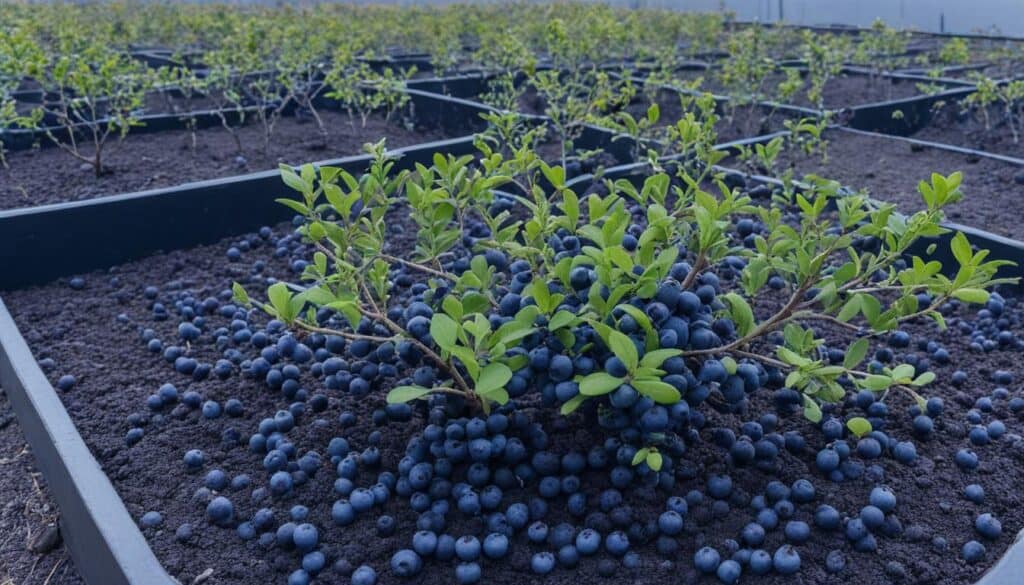
| Variety | Chill Hours |
|---|---|
| Bluegold | 800-900 |
| Bluecrop | 800-900 |
| Jersey | 800-900 |
| Sunshine Blue | 400-500 |
| Jewel | 400-500 |
Soil pH and Blueberry Fruit Production
When it comes to blueberry fruit production, the pH level of the soil plays a crucial role. Blueberries thrive in acidic soil with a pH between 4.2 and 5.0. If the soil pH is too high, it can hinder the blueberry bushes from producing the desired fruit.
It is essential to test the soil pH before planting blueberry bushes. This simple step can provide valuable information about the soil’s acidity level and help you make any necessary adjustments to create the optimal growing conditions for your blueberries.
If the soil pH is too high, there are several techniques you can use to lower it. One method is to add elemental sulfur to the soil. Another option is to incorporate organic matter like coffee grounds, peat moss, or acidic mulch. These substances can help acidify the soil, creating a more suitable environment for blueberry bushes to produce berries.
“Maintaining the appropriate soil pH is essential for blueberry bushes to produce berries.”
By ensuring the soil pH is within the recommended range, you are providing an optimal environment for blueberry bushes to thrive and produce an abundance of delicious berries.
Benefits of Maintaining Proper Soil pH for Blueberries
Maintaining the appropriate soil pH for blueberries offers several benefits, including:
- Promoting healthy root development and nutrient uptake
- Enhancing flower bud development and fruit set
- Improving overall plant vigor and growth
- Increasing resistance to diseases and pests
With the right soil pH, your blueberry bushes will have the best chance of producing an abundant harvest of juicy, flavorful berries.
Soil pH Testing and Adjustment
To determine the soil pH, you can use a soil testing kit or send a soil sample to a laboratory for analysis. The results will indicate whether your soil falls within the optimal range for blueberries.
If the soil pH is too high, you can gradually lower it over time. It’s important to note that changes in soil pH are not immediate. Be patient and avoid making drastic adjustments all at once, as this can harm the plants.
Regularly monitor the soil pH of your blueberry planting area and make adjustments as needed. This ongoing care will provide the best environment for your blueberry bushes to produce an abundant crop of sweet, tangy berries.
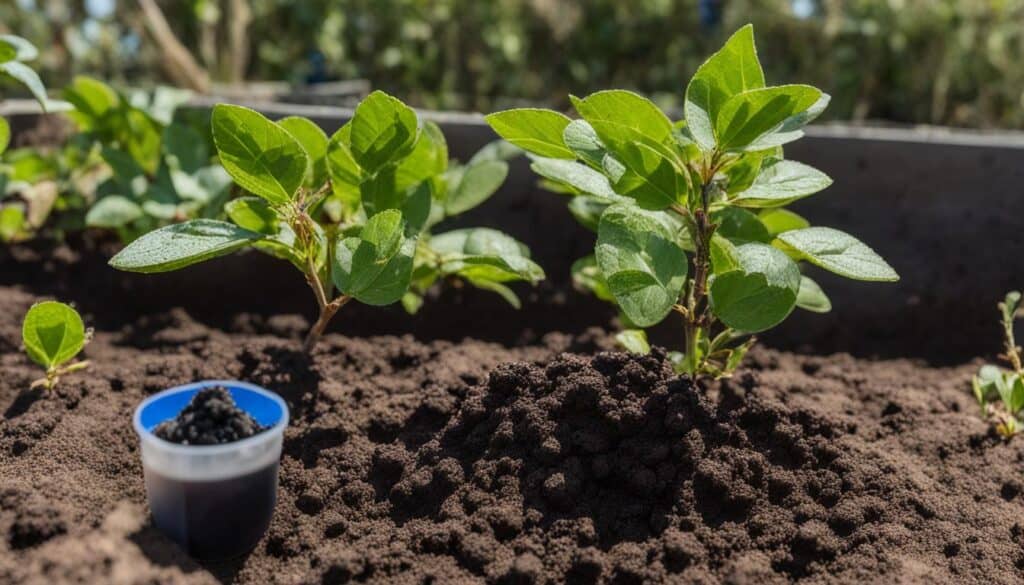
| Soil pH Level | Level of Acidity/Alkalinity |
|---|---|
| Below 4.2 | Very acidic |
| 4.2 – 5.0 | Ideal range for blueberries |
| Above 5.0 | Less ideal, may prevent fruit production |
Pruning and Blueberry Fruit Set
Regular pruning is essential for maintaining the health of blueberry plants and promoting optimal fruit production. Pruning helps stimulate new growth, improves the overall structure of the plant, and enhances fruit set on blueberry bushes.
When it comes to pruning blueberry bushes, it’s important to understand that the most fruitful canes are typically between four to eight years old and have a diameter of 1-1 ½ inches. These canes are more productive in producing berries.
Pruning should be carried out during the dormant season, usually in late winter or early spring, before new growth starts. During this time, remove low growth, dead or weak canes, and any branches that are crossing or overcrowding the center of the plant.
The goal of pruning is to maintain a plant with a balance of young and older canes, ensuring optimal fruit production. By removing older canes, you encourage new growth and maximize the potential for fruit production in subsequent seasons.
Overall, proper pruning techniques help improve air circulation, increase sunlight penetration, and reduce disease and pest issues. It also creates a more manageable plant size, making it easier to care for and harvest the berries.
Remember, each blueberry plant may have different growth habits and pruning requirements, so it’s essential to familiarize yourself with the specific needs of the variety you are growing. Ask your local nursery or consult a gardening expert for guidance tailored to your blueberry bushes.
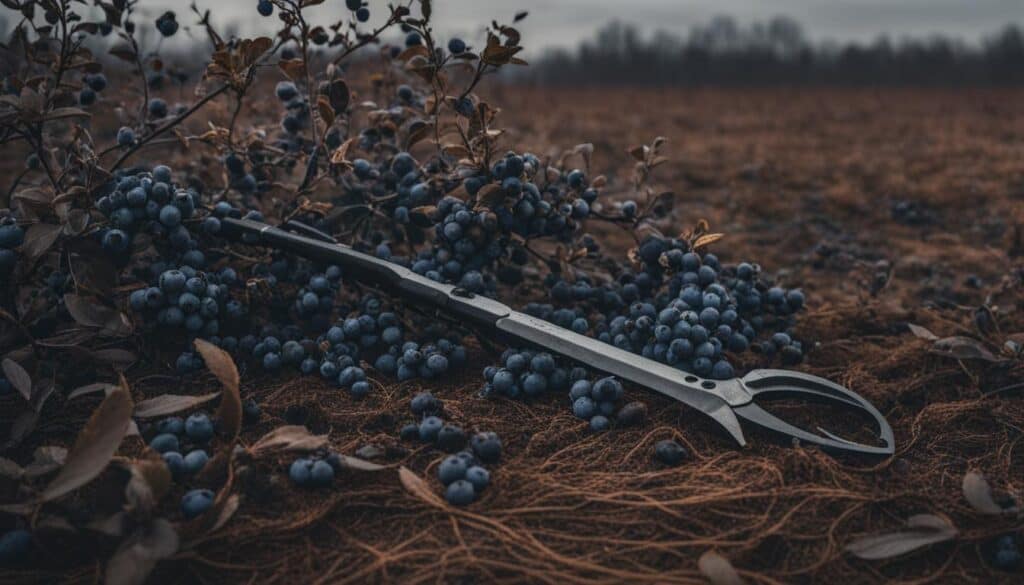
| Benefits of Pruning Blueberry Bushes | Techniques |
|---|---|
| Stimulates new growth | Remove low growth, dead or weak canes |
| Improves plant structure | Prune during the dormant season |
| Enhances fruit production | Thin overcrowded branches |
| Promotes air circulation and sunlight penetration | Avoid excessive pruning |
Fertilization and Blueberry Fruit Production
When it comes to blueberry bushes not producing fruit, proper fertilization plays a crucial role. Blueberries have specific nutrient requirements, particularly for nitrogen, which is essential for fruit production.
Ammonium sulfate or urea are common sources of nitrogen that can be applied to blueberry bushes. However, it’s important to note that fertilization should not be done in the first year of planting. The roots of young blueberry plants are delicate and can easily be damaged by excessive fertilization.
In the second year and onwards, it’s recommended to apply fertilizer gradually, starting with a specific amount and increasing it as the plant grows. This ensures that the blueberry bush receives the necessary nutrients without overwhelming its young root system.
A soil test can provide valuable information about the nutrient levels in the soil, including nitrogen, phosphorus, and potassium (NPK). Based on the results, supplemental fertilizer can be added to meet the blueberry bush’s specific needs.
Regular fertilization is important for blueberry bushes to produce fruit consistently. It helps promote healthy growth, supports flower bud development, and increases fruit set. However, it’s crucial to follow recommended fertilization guidelines and avoid over-fertilization, which can lead to imbalanced nutrient levels and potentially harm the plant.
Recommended Fertilization Schedule for Blueberry Bushes
| Plant Age | Fertilizer Amount | Frequency |
|---|---|---|
| First Year | No fertilizer | – |
| Second Year | 1/4 cup (42g) of ammonium sulfate or urea | Every 6-8 weeks during the growing season |
| Third Year | 1/2 cup (85g) of ammonium sulfate or urea | Every 6-8 weeks during the growing season |
| Fourth Year and Older | 1 cup (170g) of ammonium sulfate or urea | Every 6-8 weeks during the growing season |
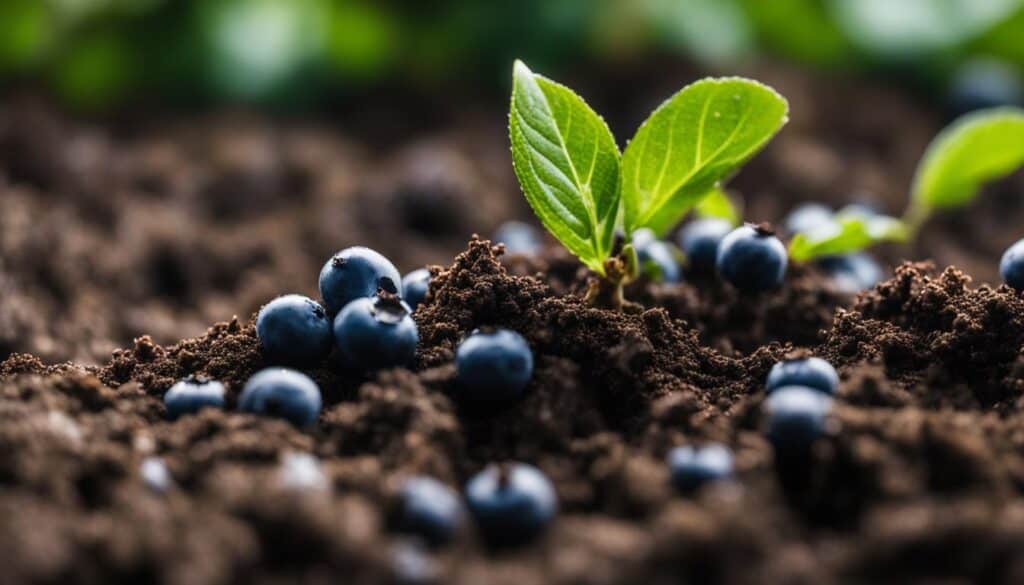
A healthy blueberry bush with proper fertilization can produce abundant fruit.
Common Pest and Bird Issues Affecting Blueberry Fruit Production
When it comes to blueberry fruit production, pests and birds can pose significant challenges. Birds have a notorious appetite for blueberries, often devouring the ripe fruit before we can get to it. To protect our precious blueberry crop, precautionary measures such as netting or the use of scare devices should be implemented.
Pests, too, can wreak havoc on blueberry bushes, leading to reduced fruit production. Common culprits include aphids, Japanese beetles, and blueberry maggots. These pests can cause damage to the plants, making it more difficult for them to yield the desired fruit.
Monitoring the blueberry bushes regularly for signs of pest infestation is crucial. By identifying the problem early on, appropriate control measures can be taken to mitigate the damage and ensure optimal fruit production. This includes targeted treatments, such as applying insecticides, when necessary and employing cultural methods to deter the pests from infesting the bushes.
“The key to protecting our blueberry bushes from pests and birds lies in proactive monitoring and taking appropriate action when needed. By staying vigilant and implementing effective control measures, we can safeguard our fruit production and enjoy a satisfying harvest of juicy blueberries.”
Common Pests and Birds Affecting Blueberry Fruit Production
| Pests | Impact | Control Measures |
|---|---|---|
| Aphids | Damage plant tissues, reduce vigor | Apply insecticidal soap or neem oil |
| Japanese Beetles | Skeletonize leaves, weaken plants | Handpick beetles or use pheromone traps |
| Blueberry Maggots | Infest berries, cause fruit drop | Apply insecticides at recommended intervals |
| Birds | Feast on ripe berries, reduce yield | Use bird netting or scare devices |
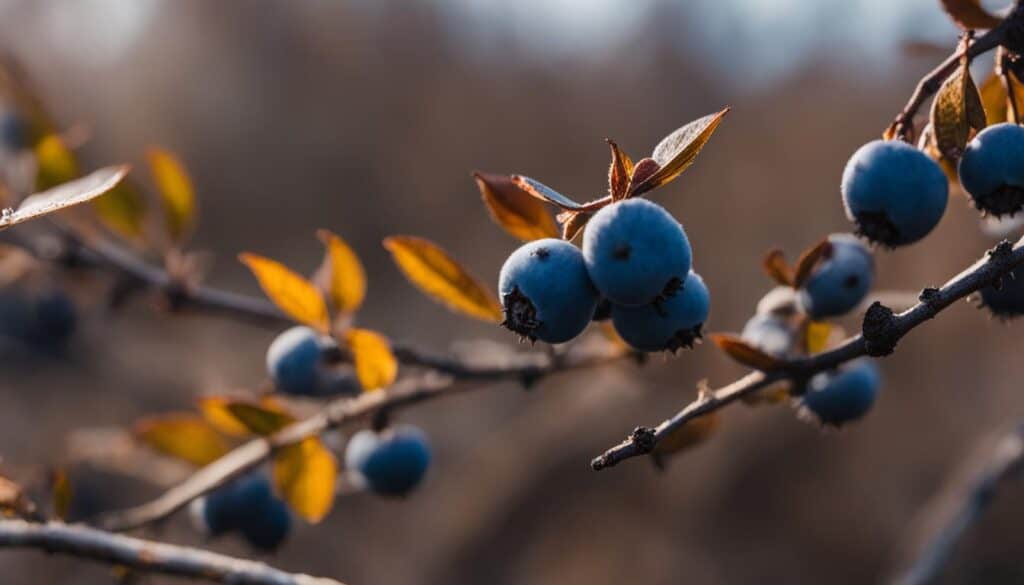
With the right monitoring and control strategies in place, we can protect our blueberry bushes from pests and birds, ensuring a fruitful harvest of delicious blueberries.
Other Factors Affecting Blueberry Fruit Production
While soil pH, pollination, pruning, fertilization, and pest control are important factors in blueberry fruit production, there are other elements that can also impact the overall yield. Weather conditions and plant health play vital roles in determining the success of blueberry bushes in producing fruit.
Adverse weather conditions such as hailstorms or heavy rains can have a significant impact on blueberry plants, leading to lower fruit production. These extreme weather events can damage the plants, affecting their ability to develop and ripen fruit. It is essential to protect blueberry bushes from severe weather whenever possible.
I always take extra precautions during hailstorms to shield my blueberry plants from damage. By covering them with a fine mesh netting or using a protective tunnel, I ensure that the fruit has a better chance of developing and reaching maturity.
Plant health also plays a crucial role in blueberry fruit production. Ensuring that the plants are healthy and well-cared for is essential to optimize their fruit-bearing capacity. This includes providing regular water and nutrient supply to the plants.
Proper irrigation is crucial in maintaining the moisture levels needed for healthy blueberry bushes. Overwatering or underwatering can negatively impact the plants’ growth and fruit production. Checking the soil moisture regularly and adjusting the watering schedule accordingly will help promote optimal conditions for fruit development.
Fertilization is another aspect of plant health that should not be overlooked. Blueberries require specific nutrients, particularly nitrogen. Applying a balanced fertilizer, focusing on nitrogen-rich options such as ammonium sulfate or urea, helps support the plants’ growth and fruit production.
Promoting Plant Health with Nutrient-Rich Fertilizers
When it comes to fertilization, I make sure to apply the recommended amount of nitrogen-based fertilizer to my blueberry plants. By following the instructions based on the plant’s age and using a slow-release fertilizer, I am confident that I am providing the necessary nutrients for optimal fruit production.
Additionally, regularly monitoring the plants for any signs of nutrient deficiencies or pests is crucial. Identifying and addressing issues promptly can prevent further stress on the plants and ensure better fruit production.
By considering all these factors, including weather conditions and plant health, growers can increase the likelihood of their blueberry bushes producing an abundant harvest of delicious, flavorful fruit.
Conclusion
Blueberry bushes not producing fruit can be a frustrating issue for growers. However, by addressing factors such as soil pH, pollination, pruning, fertilization, pest control, and weather conditions, it is possible to improve fruit production on blueberry bushes. Taking proper care of the plants and creating suitable growing conditions can lead to a bountiful harvest of delicious blueberries.
FAQ
Why is my blueberry bush not producing fruit?
There could be several reasons for no fruit on a blueberry bush, including improper soil pH, insufficient pollination, pests, the age of the plant, pruning techniques, and fertilizer application. Addressing these factors can encourage fruit production on blueberry bushes.
How can I improve fruit production on my blueberry bush?
To improve fruit production, make sure your blueberry bush is planted in acidic soil with a pH below 5.5 and in a location with full sun. Ensure proper pollination by planting another blueberry variety nearby for cross-pollination. Protect the fruit from birds with netting or scare devices. Prune the plant according to recommended techniques and fertilize with nitrogen-based fertilizers. Addressing these factors can help increase fruit production on blueberry bushes.
What factors can affect blueberry fruit production?
Factors that can affect fruit production on blueberry bushes include soil conditions, pollination, age of the plant, pruning techniques, and fertilizer application. Other factors include winter chill requirements, weather conditions, and plant health. Considering and addressing these factors can optimize fruit production on blueberry bushes.
How do I choose the right blueberry variety for my climate zone?
The right blueberry variety for your climate zone depends on winter chill requirements. High chill varieties require more than 800 chill hours, while low chill varieties can set fruit with less than 800 chill hours. Choose a variety suitable for your climate zone to ensure proper fruit production, with high chill varieties suitable for northern states and low chill varieties preferred for southern states.
Does soil pH affect blueberry fruit production?
Yes, blueberries require acidic soil with a pH between 4.2 and 5.0 for optimal fruit production. Test the soil pH and amend it if necessary with substances like sulfur, coffee grounds, peat moss, or acidic mulch to achieve the appropriate pH range. Maintaining the correct soil pH is crucial for blueberry bushes to produce berries.
How does pruning affect blueberry fruit set?
Pruning is important for blueberry plants as it promotes fruit set. During the plant’s dormant season, remove low growth, dead, or weak canes. Pruning stimulates new growth and improves fruit production. Aim for a balance of young and older canes, focusing on canes that are between four to eight years old and 1-1 ½ inch in diameter.
How should I fertilize blueberry bushes for fruit production?
Blueberries require specific fertilization with nitrogen in the form of ammonium sulfate or urea. Avoid fertilizing in the first year of planting to prevent root damage. In the second year, apply a specific amount of fertilizer, gradually increasing as the plant grows. A soil test can help determine if additional NPK fertilizer is needed. Regular fertilization is essential for blueberry bushes to produce fruit.
What pest and bird issues can impact blueberry fruit production?
Pests like aphids, Japanese beetles, and blueberry maggots can damage blueberry plants and reduce fruit production. Birds are also known to feed on blueberries, so protective measures like netting or scare devices should be used to prevent bird damage. Monitoring for pests and taking appropriate control measures is crucial to ensure optimal fruit production on blueberry bushes.
What other factors can affect blueberry fruit production?
Other factors that can affect fruit production on blueberry bushes include adverse weather conditions like hailstorms or heavy rains, as well as the overall health of the plants. Ensuring proper care, including regular watering and nutrient supply, can help optimize fruit production. Considering and addressing all these factors can improve blueberry fruit production.
How can I address blueberry bushes not producing fruit?
Blueberry bushes not producing fruit can be a frustrating issue for growers. However, by addressing factors such as soil pH, pollination, pruning, fertilization, pest control, and weather conditions, it is possible to improve fruit production on blueberry bushes. Taking proper care of the plants and creating suitable growing conditions can lead to a bountiful harvest of delicious blueberries.

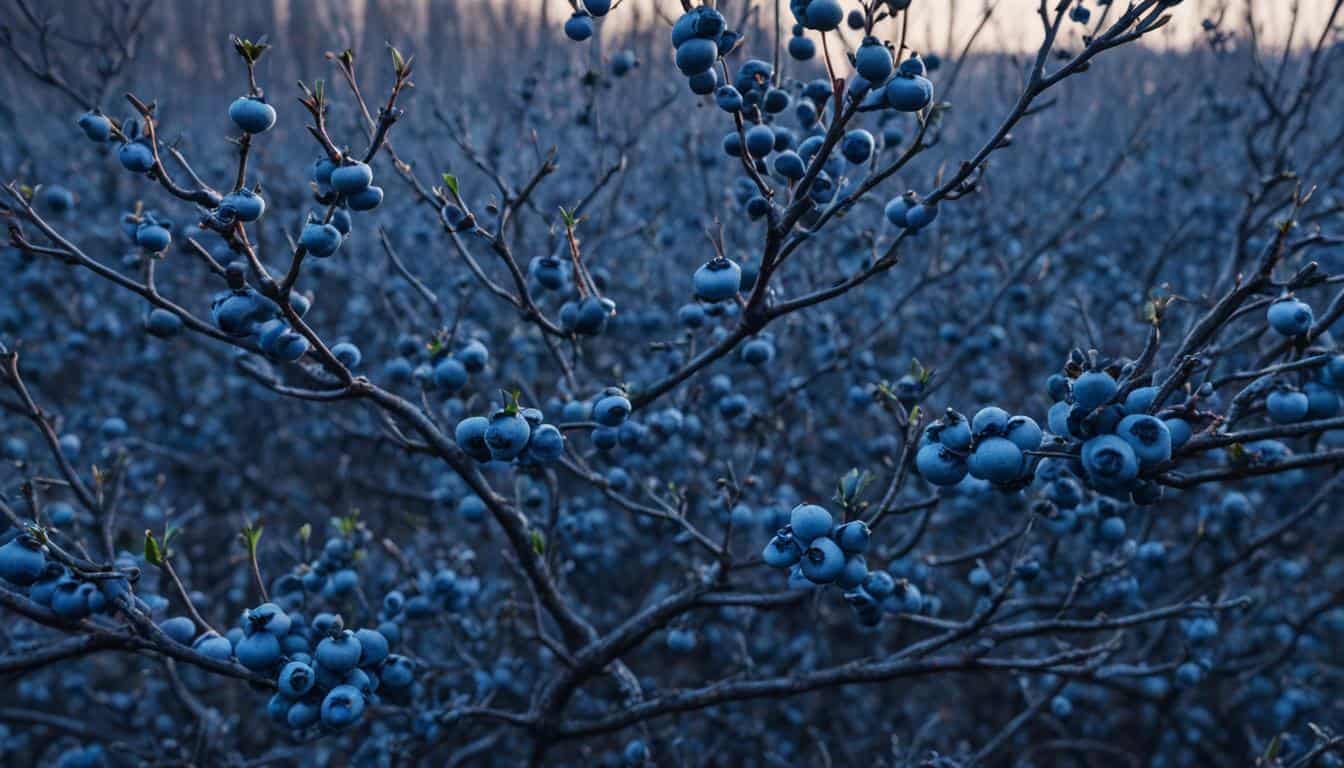



Leave a Reply